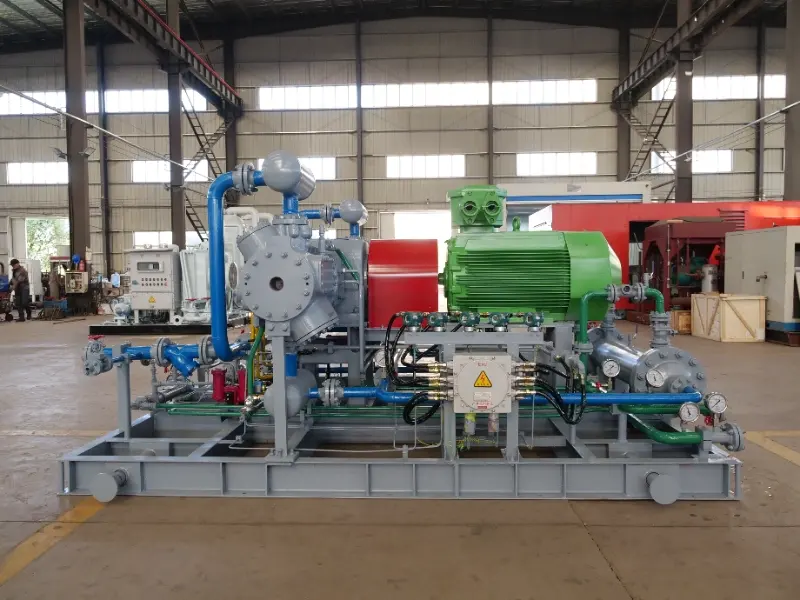As the global demand for clean energy continues to increase, hydrogen, as a green and environmentally friendly energy source, has received increasing attention. Hydrogen compressors play a vital role in the production, storage and transportation of hydrogen. Hydrogen compressors are not only the core equipment in the hydrogen industry chain, but also play an indispensable role in energy conversion and storage systems. This article will take you to an in-depth understanding of the working principle, application areas and contribution of hydrogen compressors to the development of clean energy.
Table of Contents
What is a hydrogen compressor?
A hydrogen compressor is a device specially designed for compressing hydrogen. Its main function is to compress hydrogen from a low pressure state to a high pressure state for storage, transportation and application. Similar to other gas compressors, the working principle of a hydrogen compressor is to pressurize hydrogen through a mechanical device, thereby reducing the volume and increasing the storage density.
Due to the special physical properties of hydrogen, hydrogen compressors must adopt a high-pressure and high-safety design to ensure the stability and safety of operation. Therefore, hydrogen compressors are usually made of high-strength materials and equipped with advanced control systems to ensure efficient and safe operation.

Working principle of hydrogen compressor
Hydrogen compressor compresses hydrogen from low pressure to high pressure through mechanical devices. Its working principle includes the following steps:
Intake phase: Hydrogen enters the compressor cylinder through the air inlet.
Compression phase: Hydrogen is compressed to high pressure under the action of the piston. Gas compression is achieved by increasing the gas density in the cylinder.
Exhaust phase: The compressed hydrogen is discharged into the gas tank or delivery system.
The efficiency of hydrogen compressor directly affects the economy and sustainability of the entire hydrogen industry chain. Therefore, when designing hydrogen compressors, it is necessary to pay attention to factors such as its energy consumption, maintenance cost and operating efficiency.
Types of hydrogen compressors
Depending on different application requirements, there are different types of hydrogen compressors, mainly including:
Reciprocating piston hydrogen compressor: This type of compressor compresses hydrogen through a reciprocating piston and is suitable for small and medium-sized hydrogen stations or gas cylinder filling. It has high compression efficiency and low maintenance cost.
Screw hydrogen compressor: Hydrogen is compressed by a rotating screw, which is suitable for large-flow, high-pressure applications, such as hydrogen production plants and large hydrogen storage stations.
Centrifugal hydrogen compressor: This type of compressor accelerates hydrogen through a high-speed rotating impeller, and then increases the gas pressure through a diffuser, which is suitable for large-scale hydrogen compression needs.
Application areas of hydrogen compressors
Hydrogen compressors are widely used in many industries, mainly including the following aspects:
Hydrogen filling stations: At hydrogen fuel cell vehicle filling stations, hydrogen needs to be compressed under high pressure before it can be stored in liquid or gaseous form, and it is convenient for vehicles to be filled.
Hydrogen storage and transportation: Hydrogen compressors play a key role in the transportation and storage of hydrogen. Through high-pressure compression, hydrogen is stored in high-pressure gas cylinders or gas tanks, which is convenient for transportation to various places of use.
Industrial gas applications: In petrochemical, metallurgical and other industries, hydrogen is often used in chemical reactions and heating processes. Hydrogen compressors provide a stable supply of hydrogen for these industries.
Hydrogen power generation: In the field of hydrogen power generation, hydrogen compressors are used to store hydrogen generated from renewable energy to ensure that hydrogen can be supplied to generator sets during peak demand.
Advantages of hydrogen compressors
High efficiency and energy saving: Modern hydrogen compressors use advanced technology and efficient compression systems to achieve efficient hydrogen compression with lower energy consumption, thereby reducing operating costs.
High safety: Since hydrogen is flammable, hydrogen compressors are designed with multiple safety measures in mind, such as pressure protection, temperature control systems, and anti-leakage design to ensure safe operation under high pressure.
Environmental protection and sustainability: With the widespread application of hydrogen energy, hydrogen compressors are also promoting the application of green energy, and their own environmental protection characteristics make them an important part of the future energy revolution.
Maintenance and care of hydrogen compressors
In order to ensure the long-term and stable operation of hydrogen compressors, regular maintenance and care are essential. Common maintenance measures include:
Regular inspection of cylinders and seals: Cylinders and seals are the core components of compressors. Regular inspection and replacement of damaged parts can effectively extend the service life of the equipment.
Cleaning and lubrication: To ensure the smooth operation of the internal components of the compressor, it is very important to clean and add the right amount of lubricant regularly.
Monitoring system: Install a real-time monitoring system to ensure that the equipment can detect abnormalities in time during operation to avoid failures.
Conclusion
With the continuous development of hydrogen energy technology, hydrogen compressors, as an indispensable key equipment in the hydrogen industry chain, will continue to promote the rapid development of the hydrogen energy industry with its technological innovation and performance improvement. In the future, hydrogen compressors will be more efficient, intelligent and environmentally friendly to meet the growing demand for clean energy.
Choosing the right hydrogen compressor can not only bring economic benefits to your company, but also contribute to the global energy transformation. As a leading hydrogen compressor supplier, Kehai is committed to providing you with high-performance hydrogen compression equipment to help your hydrogen energy project successfully land.
